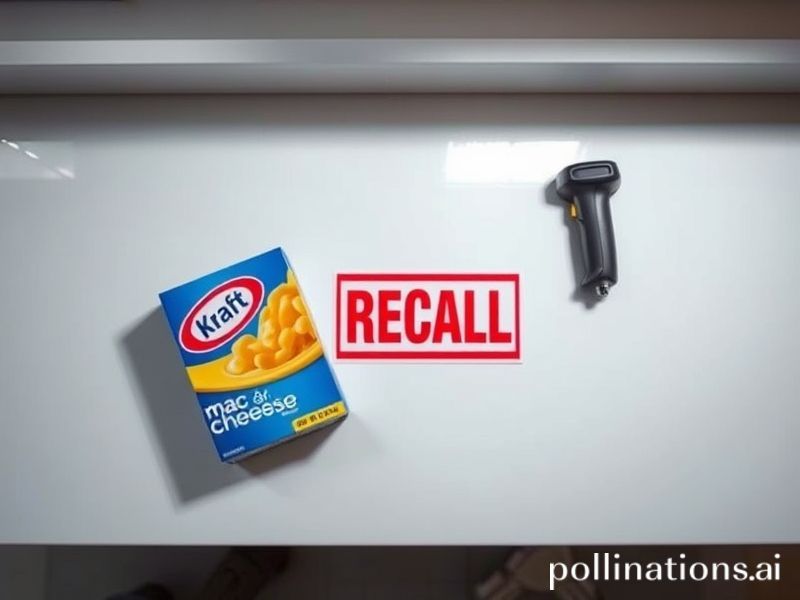Mac Attack: When the World’s Cheapest Comfort Food Declares War on Humanity
Global Kraft-Up: When the World’s Favourite Emergency Meal Tries to Kill Us All
Geneva—While diplomats at the Palais des Nations argue over carbon ceilings and the precise shade of beige that constitutes a war crime, the U.S. Food and Drug Administration has issued a worldwide recall of certain boxed macaroni and cheese products after discovering “potential foreign metal contamination.” Translation: somewhere between the fluorescent cheese powder and the elbow pasta, there lurks shrapnel. If you were planning to celebrate the end of civilization with the culinary equivalent of a comfort blanket, think again; even apocalypse rations are unionising.
The recall spans the United States, Canada, bits of Central America, and—thanks to the miracle of trans-oceanic container ships—shelves from Manila to Manchester. In other words, the same logistical web that ferries fentanyl precursors and knockoff Yeezys now doubles as a courier service for rogue iron filings. Globalisation: it giveth cheap electronics and taketh away the illusion that dinner won’t require a tetanus booster.
For the uninitiated, boxed mac and cheese is the lingua franca of broke college students, overworked parents, and anyone who has ever looked at a stovetop and thought, “I’d rather not risk it.” It is the dish that taught an entire generation that “cheese” can be a powder and “cooking” can be reduced to three steps, two of which involve boiling water. To see it recalled is to watch the last campfire of Western civilisation flicker out—only to learn the wood was pressure-treated.
The FDA’s announcement arrived with the usual bureaucratic poetry: “Consumers are advised to check lot codes and dispose of affected product.” Somewhere in Ottawa, a mid-level civil servant is drafting a French translation that still manages to sound apologetic. Meanwhile in Berlin, food-safety inspectors have opened secondary investigations because Germany cannot fathom why anyone would eat cheese from a foil packet in the first place. Cultural relativism dies hard—especially when the culture in question thinks Velveeta is a dairy product.
Emerging markets are taking notes. Lagos entrepreneurs who once smuggled in pallets of the stuff for “expat nostalgia mark-ups” are now stuck with warehouse aisles of potentially magnetic dinner. Nairobi influencers—yes, they exist, and yes, they have ring lights—have pivoted to dramatic unboxing videos where they wave magnets over neon noodles like witch doctors divining the future of late-stage capitalism. The comments sections are, predictably, aflame with conspiracy theories involving Big Pasta, Big Magnet, and the CIA.
Of course, the real victims are not the influencers, nor even the Midwestern dads who must now contemplate boiling actual pasta. The casualties are the global poor who rely on shelf-stable calories when supply chains hiccup, currencies nosedive, or yet another junta decides to close the ports. When the cheapest hot meal in town becomes a choking hazard, food security stops being an academic phrase and starts being a mouthful of steel.
Climate change, ever the opportunist, is circling the bowl. Droughts in durum-wheat belts, freight emissions that would make a coal baron blush, and packaging plastics that will outlast the pyramids—all conspired to put that blue box in your cupboard. The metal filings are merely an exclamation point on a sentence humanity began writing in 1953, the year Kraft first sold its “instant” version. We wanted convenience; the universe handed us a side order of heavy-metal seasoning.
And so the planet spins on. Stock markets in New York barely burped at the news—there’s always crypto to fill the carbohydrate void. The World Health Organization has convened a working group, because nothing says “urgent” like a Zoom call scheduled three weeks from Thursday. Somewhere in the Pacific, a cargo captain jettisons 2,000 recalled cartons into international waters, ensuring that even jellyfish will soon glow an unsettling shade of cheddar.
Conclusion: If the boxed mac and cheese recall teaches us anything, it is that no comfort is truly global until it can disappoint everyone simultaneously. We built an interconnected world capable of delivering cheesy nostalgia to every corner of the earth, then promptly forgot to check for loose screws. The next time you tear open a foil packet, remember: that metallic crunch might not be the sound of progress—it might just be progress biting back.







